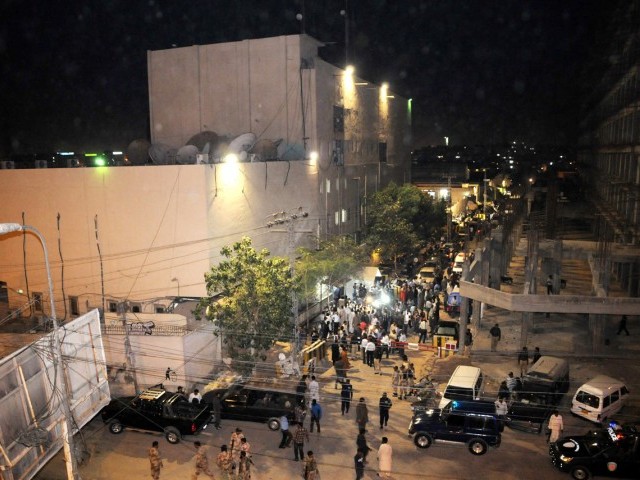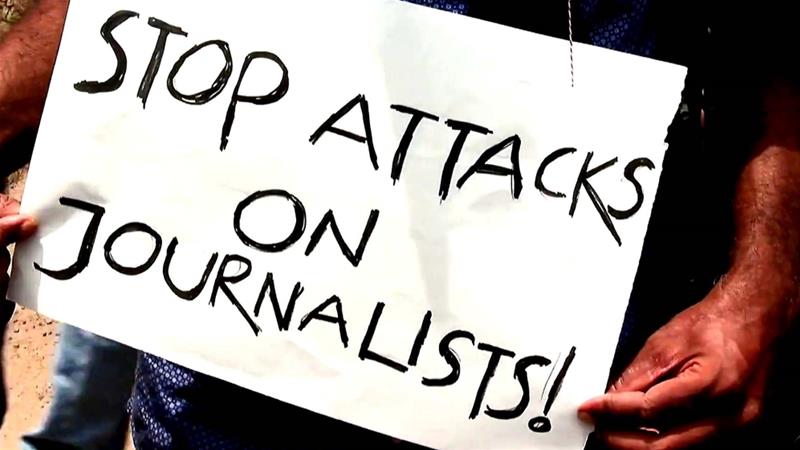An attack on Express Media Group’s Karachi office on December 2, 2013, is a direct assault on “Freedom of the Press.” It is not simply a wake-up call, but perhaps, a final call for the media. Sadly, attack on one group or journalists never been considered as an attack on the “media industry” as in the past. I wonder why we never responded to such attacks collectively? Marketing or competition should not come in the way, when it is terrorism, because it is like a fatal disease which can affect us all.
No one has so far claimed the responsibility of the attack but apparently the failure of the police and intelligence in the first probe (an attack on the same group in early 2013) resulted in the second assault on December 2, 2013. This time, they were more organized and picked the
peak time when journalists were busy in rushing to the office to meet the “deadlines.” Safety measures taken after the first attack and rapid response from the security guards also foiled the possible attempt to enter the office premises.
However, police and intelligence agencies never probed the previous attack and instead closed the investigation as a “blind case.” The question is why? Was no report on investigation of the first attack filed? Were no arrests made? All this, it appears, gave encouragement to the assailants. In the first attack they came on two motorcycles. This time they were more in numbers. Where were police mobiles and why was police protection removed?
It is high time to rise and defend “Press Freedoms” in Pakistan. Silence will not save us journalists. Today, it is Express, tomorrow it can be other media groups. Remember the famous lines, “When they came for me, there was no one left to speak for me”?
Here I recall when we fought a battle from a united platform of media with all the media stakeholders including owners, editors, journalists, hawkers with one voice observed “One Day Strike” and shut down newspapers when journalists came under attack and were killed.
I remember the 1989 strike against the killing of three journalists. All Pakistan Newspaper Society (APNS), Council of Pakistan Newspaper editors (CPNE), Pakistan Federal Union of Journalists (PFUJ), All Pakistan Newspaper Employees Council (APNEC) and Akhbar Farosh Federation (AFF) were on one platform.
Again in 1995, when the than government closed six Karachi evening newspapers, a Joint Action Committee was formed and threatened to go on strike, if the ban was not lifted. The warning worked out and within three days the ban was lifted.
The question is why can’t this be done now? What are we journalists and media workers waiting and editors and media owners for? The next attack could be on another media group or on group of journalists, which God forbid, could be fatal, as it has been for dozens of journalists killed in the past decade. If we in the media sector act today, it can give a strong message to all those who are planning to suppress the people’s voice – this time through naked terror – and also help roll back the level of impunity against journalists in Pakistan.
No safety measure, training or deployment of forces ever provided 100 per cent guarantee for the protection of journalists and any media house, but a united front of media owners, editors and working journalists, hawkers and TV cable operators can be an effective forum to optimize security and protection.
Every media house in Pakistan must take the attack on one group as an attack on all media in Pakistan. If in the 1950s there could be a joint editorial demanding a controversial ban on “Civil and Military Gazette,” why can’t we now do it for the “right reason”? A joint editorial duly approved by APNS, CPNE and Pakistan Broadcasters Association (PBA) condemning the attack on the media can boost our morale and properly demonstrate resolve to fight this battle from a united platform.
The symptoms of the December 2, 2013 attack indicate that the assailants were highly professional as despite the very congested area and during normal traffic jam around the bridge and adjacent lanes, they managed to escape after completing their attack. The assailants must have been provided “proper cover” by their accomplices.
Pakistani journalists have already paid huge price. In the post-9/11 period, nearly 100 journalists have been killed, some of them were brutally murdered after been kidnapped and tortured. Media houses in Pakistan or their bureaus in different parts of the
country, particularly Khyber Pakhtunkhwa, Federally Administered Tribal Areas and Balochistan are under constant threat. Their cases have neither been properly investigated nor prosecuted. Yet, journalism has expanded from print to electronic, online to social media.
Will we in the media sector in Pakistan all rise to the occasion? Silence will be as fatal and risky as in the battlefield. We got this freedom after a very long struggle and we should not let it die by failing to close our ranks to fight the attacks on media and journalists as a mission.
—————————————————————————————————————————————
Mazhar Abbas is the former Secretary General of Pakistan Federal Union of Journalists and a seasoned journalist.
—————————————————————————————————————————————-
Image: Courtesy Express Tribune
Final Call For The Media
- December 3, 2013
- 12:40 pm
- No Comments
More from the News section
July 26, 2023
No Comments
June 20, 2023
2 Comments
March 21, 2023
No Comments
August 30, 2022
No Comments
August 30, 2022
No Comments

Resize text-+=
